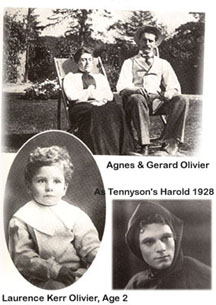

News | Entry | Contents | Biography | Films | Awards | Links | This
& That I & II | Rebecca | One Degree | Entertainer | On
Acting | Brideshead | Henry
V | Hamlet | Lady X | Wuthering
Heights | Theatre | His Wives | Pictures | The Idol | Pictures
2 | Pictures
3 |Speeches | Spartacus | Richard III | Jean
Howard's Pics | Theater Week Magazine | Time
Magazine 1946 | Olivier/ Leigh Homes | The Musical "Time" |
 Photos scanned from Laurence Olivier by Donald Spoto |
|
Olivier, Laurence Kerr (BARON OLIVIER OF BRIGHTON). British actor and director (b. May 22, 1907, Dorking, Surrey England--d. July 11, 1989, Steyning, West Sussex. England), was the founding director (1962-73) of the British National Theater and was hailed by many as the greatest actor of the 20th century. He dazzled audiences with brilliant acting, athleticism, and elaborate costumes, makeup, and vocal techniques. Olivier, who began acting as a child, attended the Central School of Speech Training and Dramatic Art and worked with the Birmingham Repertory Company (1926-1928). His breakthrough came in Noel Coward's Private Lives (1930), and in Romeo and Juliet (1935). in which he alternated the roles of Romeo and Mercutio with John Gielgud, he began his distinguished classical career. Olivier gained international movie stardom and the first of 10 Academy Award nominations for his portrayal of Heathcliff in Wuthering Heights (1939). He followed this with popular romantic leads in Rebecca and Pride and Prejudice (both 1940). As codirector (1944-49) with Ralph Richardson of the rejuvenated Old Vic Theatre Company, Olivier specialized in Shakespearean roles, many of which he transferred to the screen. both as actor and as director. These included Henry V (1944), for which he received a special Oscar-: Hamlet (1948). which won Oscars for best actor and best picture. Richard 111(1955). and Othello, (1965). Olivier also starred in several plays and films with his second wife, Vivien Leigh. In 1957 he broke away from classical roles and achieved new success with his portrayal of the seedy third-rate vaudevillian Archie Rice in John Osborne's The Entertainer (filmed 1960). In 1962 Olivier was named actor-manager of the new National Theatre, where he appeared in such varied plays as Shakespeare's The Merchant of Venice, August Strindberg's Dance of' Death and Anton Chekhov’s Three Sisters. He retired from the stage in 1974 to focus on motion pictures and television. Although critics derided much of his later work. Olivier received Oscar nominations for Sleuth (1972), The Marathon Man (1976) and The Boys from Brazil (1978). He also garnered five television Emmy awards, most notably for adaptations of Eugene O'Neill's Long Day's Journey Into Night (1973), Love Among the Ruins (1975), and Brideshead Revisited (1982). In 1983 he starred in an acclaimed television staging of King Lear. Olivier was repeatedly stricken by debilitating illnesses in the 1970s and 1980s. hut he continued to act- making his last television appearance in War Requiem (I988). He published his memoirs in 1982, followed by On Acting (1986). Olivier was knighted in 1947, and in 1970 he was elevated to a life peerage, the first of his profession to be so honoured. As a final tribute from the nation, it was announced that Olivier would be the fifth actor in history to be buried in Westminster Abbey. From the Britannica Book of the Year 1990 |
|
The pictures on the site were scanned by me from various Olivier books I own or borrowed from the library. Some were given to me by friends. Where there is text, I have told where it was from. Olivier
- By Robert Tanitch |